M Sadiq
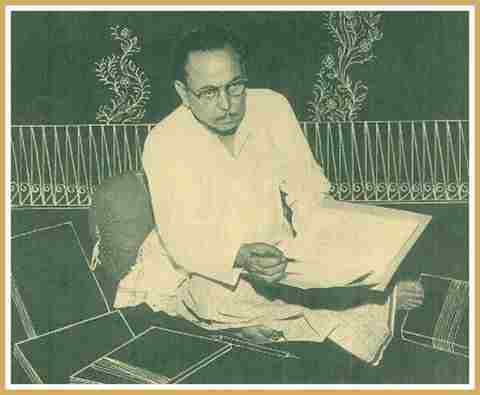
Subscribe to read full article
This section is for paid subscribers only. Our subscription is only $37/- for one full year.
You get unlimited access to all paid section and features on the website with this subscription.
Not ready for a full subscription?
You can access this article for $2, and have it saved to your account for one year.
"I have no heritage; I am a self-made man and proud of the fact. All that I have was acquired from life with my own efforts." So says M Sadiq, one of the busiest and most flourishing directors today in Bombay's filmdom. His most recent film is "Taj Mahal", a historical at the box-office with its success and has provoked several producers to drop the contemporary themes in hand and rush to the brittle pages of medieval history texts.
Prior to "Taj Mahal", Sadiq made Guru Dutt's "Chaudhvin Ka Chand", another box-office storm, which sent the stock of Muslim romantic themes soaring with producers who continue to be attracted by any romantic story which has Muslim characters wearing dated costumes and sporting dated manners. Sadiq himself is in to repeat the success formula of his last two pictures in the four assignments that he has now got in hand. One of them is Zenith Productions' "Noorjehan", a historical theme starring Meena Kumari and Pradeep Kumar. Another is Sanamkada's "Bahu Begum", a Muslim romance again starring Meena Kumari and Pradeep Kumar. "Salma", which he is making for Kwatra Art Productions, is also a Muslim romance set against the Lucknow backdrop. His fourth assignment, sealed the other day with producer Guru Dutt, again involves romantic tale.
Education for Life
Mohammed Sadiq, who has been in films for almost three decades now and has so far directed about two dozen films (Many of them his own productions), was born in Lahore on March 2, 1911, in a family of small traders. He says his boyhood was a colourless affair in which here were no games or thrills. Soon after passing his matriculation examination in 1927, he got a job as a clerk-cum-telephone operator in the Chief Mechanical Engineer's office in Kenya and Uganda Railways and Harbours Administration. The job took him to Nairobi where he spent two years earning a salary of 150 shillings a month. Family problems then brought him back to Lahore where, in 1930, he joined producer A R Kardar's United Players Corporation as a clerk.
Kardar's concern folded up in 1931 and Sadiq spent the next four years, a period of grim struggle for existence, doing a variety of odd jobs. Picking and quitting, according to the pressure of the moment, one job after another, he served variously as typist, day-book writer in a bank, lithographer and press compositor. Those four years, Sadiq says "educated me in the ways of life." The one thing that made him cultivate the habit of talking less and observing more in life was his defective speech. A stammered since childhood (he still stammers), he would generally provoke ridicule whenever he opened his mouth to speak. This taught him to speak only when he must.
He was working as the head clerk in a concern called Lakshmi Petroleum Company when A R Kardar, who was then directing films in Calcutta, took him away to Calcutta as his assistant; Sadiq thus started his film career under Kardar in 1935. The first picture with which he was associated was "Baghi Sipahi". Sadiq assisted Kardar in Calcutta in two more films and towards the end of 1937 came to Bombay where Kardar had an assignment to direct "Baghban".
After "Baghban," Sadiq followed Kardar into Ranjit Film Company for whom the duo made two films, "Thokar" and "Holi". On these two films, besides being the assistant director, Sadiq was also the story and dialogue writer. He assisted Kardar in four more films one of which ("Pooja") he also wrote.
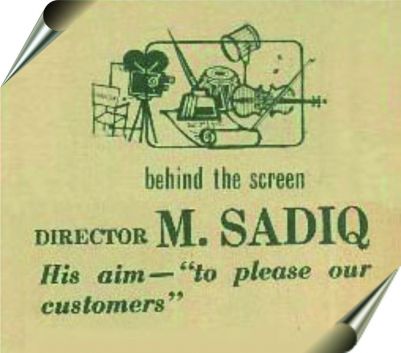
In 1942, one year after Kardar had launched his own concern Kardar Productions, Sadiq got his first assignment to direct a film. The result was "Namaste" (also written by him) which became a silver jubilee hit. "Jeevan" was the next film that Sadiq directed for Kardar. "Jeevan" was followed by "Rattan" which Sadiq directed for producer Jaimini Dewan. "Rattan" became a widely popular picture which collected record grosses and with that Sadiq established himself in the 'Who's Who' of Bombay's film world.
After "Rattan", Sadiq parted company with Kardar and went on to make some five films, including "Jag Biti " (1946) and "Kajal" (1948), in almost as many years. Then in 1949, he set up his own producing concern, Sadiq Productions and made about eight films under the banner. Three of them were "Sabak" (1950), "Saiyan" (1951) and "Shabab" (1954), and the rests all Johnny Walker starring comedies, were "Musafir Khana" (1955) "Chhoo Mantar" (1956), "Duniya Rang Rangeeli" (1957), "Mai Baap" (1957) and "Khota Paisa" (1958).
Along the way, Sadiq also directed for others "Pardes", "Poonam", "Jawani Ki Hawa" and "Anjaan". When his own concern began showing symptoms of economic ill-health, Sadiq closed it down and in 1959 started directing the film which was to revive his glory as a "hit-maker". The film was producer Guru Dutt's "Chaudhvin Ka Chand" which won him Bombay Film Journalists' Associations' Best Director award. Ever since the box-office performance of "Chaudhvin Ka Chand" was noted and digested in the film world, Sadiq has been director in hot demand. And since he says he has washed his hands of film production, it seems he will now confine his filmic activities to direction.
A man who can admire Satyajit Ray's "Pather Panchali" as "an example of fine art", Sadiq is clear about his own aim as a conventional film-maker which is "to please our customers". He realises some of the absurdities of the commercial cinema which would require even historical figures like Shahjehan and Noorjehan to express themselves through crooning. But he defends Indian films as against much of the foreign cinema by saying, "Our films have no nudity, no vulgarity, no sex obsession. We keep our hero and heroine at a yard's distance from each other. And yet our films, without resorting to the sexy angles of foreign films, do very well at the box-office".
Accent on Planning
Sadiq, however, cannot understand why the same people who undertake elaborate planning including land surveys, preparation of blueprints and cost estimates while considering the construction of a building worth, maybe, a lakh of rupees, disperse with the least semblance of planning while launching a film worth, as it often is, some forty lakhs of rupees. He thinks that a script complete from A to Z is a prime necessity before a film-maker goes on the floor.
A man of simple habits and father of a college-going son, Sadiq does not smoke or drink and says that his hobbies are confined to collecting rare books on history and architecture and entering the kitchen to cook some of his favourite dishes like "biryani" and "ran musallam".
This article was published in Filmfare magazine’s 29 May, 1964 edition.
The images appeared in this feature are from the original article.
About the Author



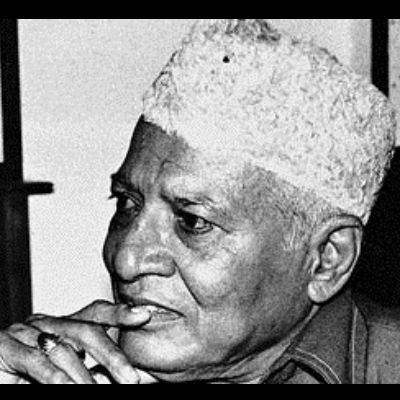
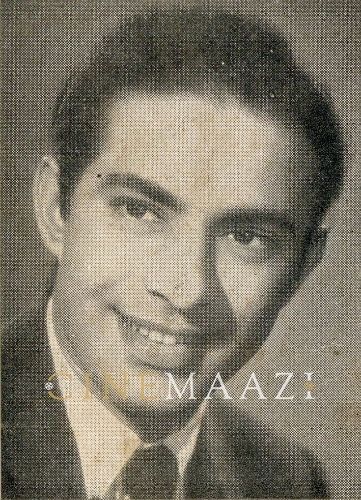
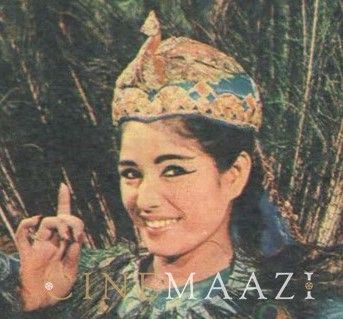
.jpg)


